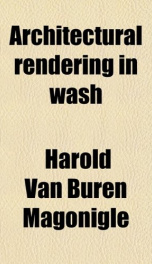architectural rendering in wash

Purchase of this book includes free trial access to www.million-books.com where you can read more than a million books for free. This is an OCR edition with typos. Excerpt from book: Ill QUARTER-, HALF-, OR THREE-QUARTER-COLOR The drawing we have just carried to conclusion is in pure monotone. It is true that we used pigments to tone the inkbut not enough to count as color. We attained our effects by the sheer relation of value to value. We have now to discuss the use of color in another way, in which the general effect of monotone is preserved but in which as we examine the various washes we plainly see that pigments have been used. It is an intermediate step between pure India Ink rendering and rendering in full color and is very flexible for we may use almost no color and yet give great quality to our drawing which remains a monotone, or use so much color that we have to all intents and purposes a drawing in full color. India Ink is still our basic tone. Whistler called black "the great harmonizer." But however questionable its use in painting in oil has since been proved to be, it is indubitably the right base for rendering architectural subjects, formally, in water color. Warm and Cold Backgrounds. It used to be a formula in the ateliers in Paris that a warm building demanded a cool background and a cool building a warm one. But this does not state the whole casewe may also make the whole drawing warm or make it all cold. The question is purely one of preference (I purposely avoid the word "taste" in this connection). There is one touchstone of successharmony, the preservationof the key. If the building is singing in A minor and the background in C minor we have a discord. I have found it possible to get a very considerable effect of color with very few pigments and keep the drawing in key. These pigments are Carmine, Vermilion, Raw Sienna, Burnt Sienna, Verte Emeraude, Cobalt Blue and French Blue. These happen to be the ones I fell int...
Info about the book
Author:
Series:
Unknown
ASIN:
B0006YH7F6
Rating:
3/5 (3)Your rating:
0/5
Languge:
English
Users who have this book
Users who want this book
What readers are saying
What do you think? Write your own comment on this book!
write a commentGenre
if you like architectural rendering in wash try:
Other books by this author
Do you want to read a book that interests you? It’s EASY!
Create an account and send a request for reading to other users on the Webpage of the book!


